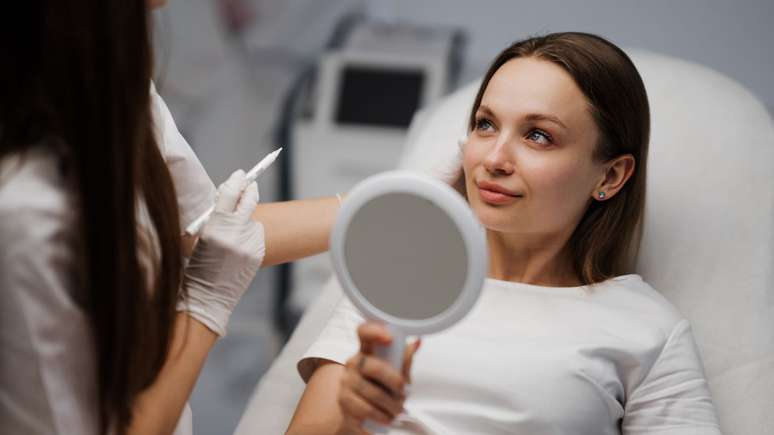The expert gives advice to avoid performing aesthetic procedures with fake professionals and ensure your safety
According to a report by the International Society of Aesthetic Plastic Surgery (ISAPS), published in 2023, Brazil stands out as the country with the second highest number of aesthetic and restorative interventions performed in the world, totaling 8.9% of the global volume, behind only the United States (24.1%).
According to the ISAPS survey, one of the main reasons is the popularization of non-surgical injectable procedures. In Brazil, the highlighted technique is the application of botulinum toxin (botox), followed by hyaluronic acid fillers and biostimulators of collagen production.
According to plastic surgeon Luís Maatz, specialist in General Surgery and Plastic Surgery at the Hospital das Clínicas da Faculdade de Medicina da USP (HC/FMUSP), the problem is that, at the same time, the number of complications arising from these procedures has also increased.
“One of the main reasons is that many specialists from other fields, who are not doctors, or doctors without specialization in plastic surgery or dermatology, perform these aesthetic treatments,” explains the member of the Brazilian Society of Plastic Surgery (SBCP).
Risk of falling into the wrong hands
Between January 2001 and July 2008, the Regional Medical Council of São Paulo (CREMESP) examined the records of 289 doctors. Of these, 139 doctors (48.1%) had no medical specialty qualification. In other words, they were identified as fake beauticians.
Additionally, 49.5% were board certified in areas unrelated to plastic surgery or cosmetic procedures. Only 2.1% of the reported physicians were plastic surgeons and 0.3% were dermatologists specializing in cosmetic procedures.
A study published in the journal Plastic and reconstructive surgery data collected in 19 Brazilian states during 2020. A total of 47,360 facial filler procedures and 1,032 complications were reported, of which, of these complications, 550 incidents occurred at the hands of professionals who were not doctorscorresponding to more than half of the total number of complications and 1.16% of the total number of procedures.
Complications identified in the study were nodules and edema at the application site (63% and 62%, respectively) and late infections (25%). Cases of arterial occlusion and ulcer formation were also reported. The area under the eyes, which has more delicate tissue, recorded 70% edema.
“In this case, for example, an unqualified professional can make mistakes in the anatomical plan and in the amount of substance to apply, using a larger volume than necessary and increasing the possibility of complications. Hence the importance of working with smaller quantities of volumes, in gradual applications, to reduce the possibility of these reactions”, emphasizes Luís Maatz.
Therefore, it is extremely important to be aware of some facts before getting carried away by the anxiety of changing your appearance. Below, discover the main precautions to identify fake beauticians during aesthetic procedures.
Even with a referral, find out as much information about the doctor as possible.
Qualified professionals for aesthetic procedures are plastic surgeons and dermatologists, who must demonstrate the title of specialist in companies regulated by the Brazilian Medical Association (AMB) and the Registry of Specialty Qualifications (RQE).
“For plastic surgery, only the plastic surgeon himself. Make sure he belongs to the Brazilian Society of Plastic Surgery (SBCP) and has the RQE for general and plastic surgery. Check the websites of the Brazilian Society of Plastic Surgery and the Brazilian Society of Plastic Surgery Dermatology,” advises Maatz.
The plastic surgeon also recommends doing a Google search, where you can find lawsuits and complaints against the doctor, as well as any negative news about the professional. This is essential to identify fake beauticians and avoid falling victim to a scam.
Be wary of overly attractive values
Those who charge very low prices may be putting profit before the patient’s health. “They usually offer nonessential procedures, pressure patients before making an informed decision, or neglect necessary care before, during, and after the procedure,” the surgeon warns.
Again, according to Maatz, it is worth consulting the SBCP, which establishes minimum parameters for each category of procedures, with the aim of ensuring excellence of care and adequate remuneration of specialists. If the professional is too low in price, it is a sign that he or she could be a fake beautician.
Check where the procedure will be performed
Check whether the procedure will be performed in a fully equipped clinic with a properly qualified team. “If you are going to have plastic surgery or a more invasive procedure, choose to have it performed in a hospital. No matter how sophisticated it is, no clinic can replace the infrastructure and safety of a hospital in an emergency,” Maatz says.
If you are undergoing surgery, find out if your doctor requires any essential pre-operative tests.
According to Luís Maatz, performing tests is essential to determine the possibility of a cosmetic procedure. “This is because if any test shows abnormalities, it will not be possible to perform the procedure until the patient has resolved the problem,” he explains. In addition, the professional must evaluate the medical and family history (including chronic/pre-existing diseases), previous surgeries, allergies, as well as the patient’s lifestyle habits.
The necessary tests, according to Maatz, generally include, in addition to a complete blood count, a fasting blood sugar test, which monitors normal glucose levels and prevents complications during surgery, and a coagulogram, which evaluates blood clotting and prevents bleeding during surgery.
They will also need to measure urea and creatinine, which check the health of the patient’s kidneys, a urine test such as EAS, which measures pH, density and other substances, and an electrocardiogram, which analyzes the electrical activity of the heart to determine if it is functioning properly. “The imaging test is essential so that the doctor can evaluate the areas that will be operated on,” adds the surgeon.
Ask about post-procedure guidelines
Upon returning to the specialist, he will have to provide all the necessary information to ensure adequate follow-up of the healing and the desired results. “Do not hesitate to clarify all your doubts. You can and should ask whatever you want, and it is the doctor’s duty not to lie and to convey to you the security that you so need to achieve your aesthetic change”, concludes Luis Maatz.
Source: Terra
Rose James is a Gossipify movie and series reviewer known for her in-depth analysis and unique perspective on the latest releases. With a background in film studies, she provides engaging and informative reviews, and keeps readers up to date with industry trends and emerging talents.







